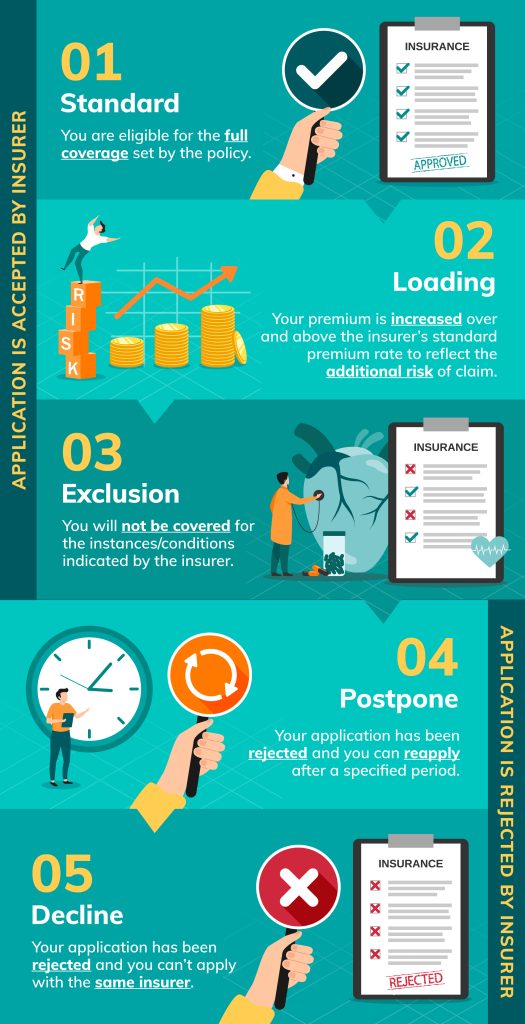Note: It was announced in November 2023 that MoneyOwl will be acquired by Temasek Trust to serve communities under a re-purposed model, and will move away from direct sale of financial products. The article is retained with original information relevant as at the date of the article only, and any mention of products or promotions is retained for reference purposes only.
______________
Insurance plays a critical role in protecting yourself and your family against financial losses and ensuring their financial security. However, with a wide range of insurance products available, choosing the right coverage can be complex, and understanding the outcome of an insurance application is essential to determine your next steps. When applying for insurance coverage, you may receive one of five outcomes: standard, loading, exclusion, postpone or decline.
What do these terms mean? Our client advisers share the implications of each outcome and address some key considerations.
What do the different outcomes mean?

Standard
If your application has been accepted, congratulations! Your coverage and benefits are now in effect, and you can receive the full protection the insurance policy offers. This is a positive outcome as it means that you have met the criteria set by the insurer and is eligible for coverage.
There are several reasons why an insurance application may receive an exclusion or a loading outcome. Some common situations include:
Loading
- Occupation: Certain occupations, such as those in the construction industry, may be considered more dangerous and result in a loading outcome.
- Health history: A person’s health history, such as illnesses or hospitalisations, may result in a loading outcome.
Exclusion
- Pre-existing medical conditions: If the applicant has a pre-existing medical condition, the insurance company may exclude coverage for that condition.
- Hazardous hobbies or activities: Engaging in hazardous hobbies or activities, such as skydiving or scuba-diving, may result in an exclusion.
- Substance abuse: Substance abuse, including drug or alcohol abuse, may also result in an exclusion.
Can I still get covered if I have a pre-existing condition or medical illness?
Applying for insurance is best done now before any medical events crop up. The fact is no one can know when it will happen. If you develop any illness that is serious enough to require ongoing medical reviews, hospital surgery, therapy or treatment or require long-term medication, you will need to expect a non-standard underwriting outcome. However, having a pre-existing condition does not mean you will be rejected. If you need to get covered, it is best to speak to an experienced adviser who can help you understand the process and walk you through the likely outcomes. However, ultimately the decision to insure lies with the insurer. Some medical conditions may not be a high enough risk, so you can still be covered via loading or exclusions. It is thus best to apply for insurance when you are well, and if you aren’t and are offered a non-standard result, feel free to talk to your experienced adviser about it instead of feeling upset and not taking it up. Remember that that are many other conditions that you could still need to be insured for.
My immediate family member was diagnosed with a serious medical condition last year. What does it mean for my insurance application?
Remember that insurers have the responsibility to ensure their pool of newly insured policyholders is within their risk level of acceptance. If their underwriters do not assess accurately, they may be forced to increase premiums later. Most of the time, if your family has conditions that are viewed as increasing your likelihood of getting it, you may get a non-standard offer for your insurance application. However, such situations defer from insurer to insurer. For example, some insurers may exclude breast-related conditions if there is a history of breast cancer in the family- both natural parents and siblings. While one insurer may require a declaration for conditions before age 50, another may require a declaration if the condition appeared before age 60. Thus, there may be differences in the underwriting standards- though most of the time, you will likely be better off expecting similar outcomes than a standard outcome if one insurer has already offered you a non-standard result.
I enjoy extreme sports. How should I approach my insurance application?
As you enjoy extreme sports, it suggests to insurers that you are living a higher-risk lifestyle. This means that there is a higher chance of injuries and premature death. Depending on the nature of your extreme sport, it may also increase the chance of particular critical illnesses. Thus, do expect a non-standard underwriting outcome. In addition, accident plans are popular if you feel you are likely to be injured. However, accident plans must not be seen as a replacement for the core insurance types like Life, Critical, Disability Income, Integrated Shield Hospital & Surgery and Long Term Care insurance. This is because accident plans pay out a smaller sum, as injuries tend to have a shorter recovery period than stroke or cancer.
How do you advise customers who receive a “postpone” or “decline” outcome on their insurance application?
When your application is declined or postponed, it usually means you have a pre-existing condition that is viewed as too risky for the insurer to accept. Sometimes, we may have done well to recover from a stage 1 cancer occurrence. You then realise it is time to increase your insurance coverage as it will likely return. Unfortunately, so does your insurer. Thus, you will likely receive a “decline” or “postpone” outcome. We have encountered insurers postponing for more than ten years before you can apply again for the insurance. For any hospital insurance application, the odds are even worse. Unfortunately, insurers are quite uniform in assessing conditions, resulting in a decline from other insurers. It is understandable if you think you do not want to declare it for the next application with another insurer, but any professional adviser will advise against this. In such scenarios, new insurance may not be an option to protect you from the next health emergency. It is best to have an honest look at your financial situation and prepare yourself for the worst-case scenarios. Remember, you do not need to struggle to do this alone. Having a conflict-free adviser with the experience, maturity, and empathy to guide you can be priceless.
Let us help!
By understanding the factors contributing to each outcome, individuals and families can make informed decisions about their insurance coverage and ensure their financial needs are met.
It’s important to note that insurance companies have different underwriting guidelines and criteria for determining whether to accept, decline, postpone, load, or exclude an insurance application. As a result, the decision may vary from one case to another.
If you would like to explore buying or enhancing your insurance or Critical Illness coverage and have any concerns about your application outcomes, our Client Advisers will be best placed to recommend a suitable course of action.
Book an appointment with our advisers here
In addition, we offer 30% first-year commission rebates for qualifying plans, so you get more value out of your insurance plans.

Disclaimer: The information contained herein does not have any regard to the specific investment objective(s), financial situation, or the particular needs of any person. Buying insurance is a long term commitment and should be bought according to your needs, and products’ suitability. You may wish to seek advice from our client adviser before making any financial decision.





